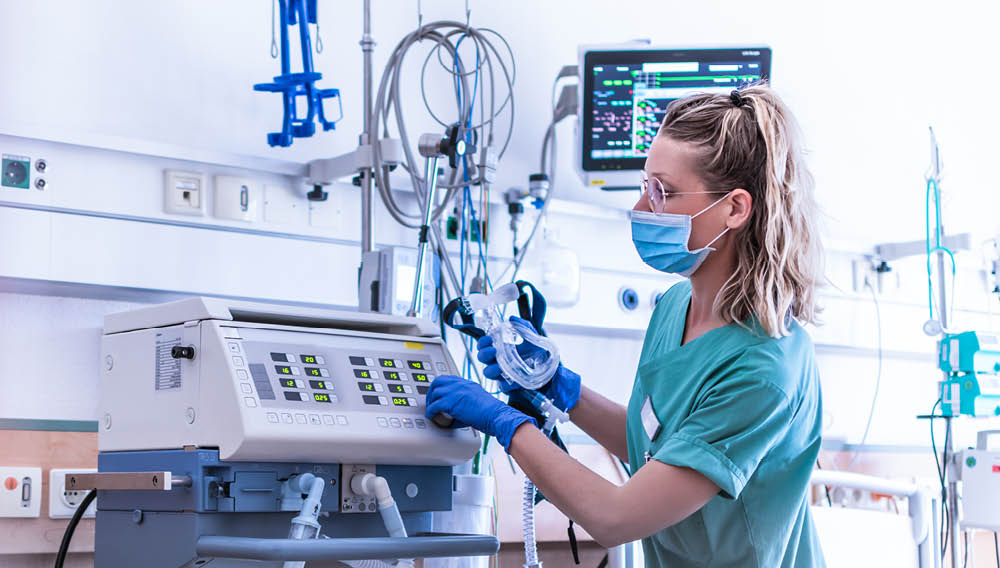How Long Does It Take to Become a Respiratory Therapist?

In-depth Look at a Career as a Respiratory Therapist
Respiratory therapists help patients with breathing difficulties and respiratory disorders breathe easier and improve their overall quality of life. If you’re interested in pursuing a career as a respiratory therapist, you may be wondering how long it takes to become one. The journey to becoming a respiratory therapist involves a combination of education, clinical training, and certification.
Let’s take a look at the path to becoming a respiratory therapist and see whether it aligns with your career goals.
Education Needed to Get Started as a Respiratory Therapist
Pursuing the right education is the most important and crucial step to becoming a respiratory therapist.
- Associate Degree: Most aspiring respiratory therapists choose to pursue an associate degree program, which typically takes about two years to complete. These programs provide a comprehensive education in respiratory therapy, including classroom instruction and clinical training.
- Bachelor’s Degree: Some individuals opt for a four-year bachelor’s degree program in respiratory therapy, which offers a more in-depth study of the field and may open additional career opportunities in management, education, or research.
Excelsior University’s Associate in Science in Health Sciences and Bachelor of Science in Health Sciences programs provide good foundations if you wish to become a respiratory therapist. These programs help expand your medical vocabulary, improve your communication skills, and provide you with a solid understanding of the U.S. health care system. They’ll help prepare you to earn the necessary associate or bachelor’s degree in respiratory therapy.
In addition to completing the educational component of your respiratory therapy program, you will also need to gain hands-on clinical experience. Clinical training is a vital part of becoming a respiratory therapist, as it allows you to apply the knowledge and skills you’ve learned in health care settings.
The amount of time dedicated to clinical training can vary depending on the program and the specific requirements of your state’s licensing board. Typically, students can expect to spend anywhere from 500 to 1,000 hours in clinical rotations during their program. This practical experience is vital in developing the skills and confidence needed to work as a respiratory therapist.
State Licensure Needed to Become a Respiratory Therapist
After successfully completing your educational program and clinical training, the next step is to become certified and licensed. Certification is usually administered by the National Board for Respiratory Care (NBRC) and is required to practice as a respiratory therapist in most states. There are two levels of certification: Certified Respiratory Therapist (CRT) and Registered Respiratory Therapist (RRT).
To become a CRT, you’ll need to pass the Therapist Multiple-Choice Examination (TMC). This exam can be taken after completing your educational program. To become an RRT, you must pass both the TMC and the Clinical Simulation Examination (CSE), which assesses your clinical skills. Many respiratory therapists choose to pursue RRT certification as it can lead to more advanced career opportunities and higher earning potential.
The time it takes to earn these certifications can vary, but it’s typically a few months of additional study and preparation.
While not required, many respiratory therapists also choose to pursue advanced certifications to further their career prospects and specialize in certain areas of respiratory care. Some common advanced certifications include the Neonatal/Pediatric Specialist (NPS) and Adult Critical Care Specialist (ACCS).
The journey to becoming a respiratory therapist involves completing an associate or bachelor’s degree program, undergoing clinical training, and obtaining certification. The total time it takes to become a respiratory therapist can range from two to five years, depending on your chosen educational path and which certifications you decide to pursue. Respiratory therapy is a rewarding career that offers opportunities to make a significant impact on patients’ lives while working alongside other health care professionals in diverse clinical settings.



